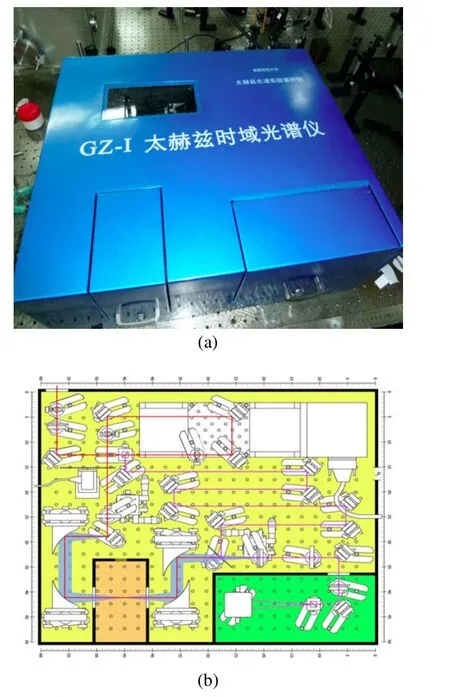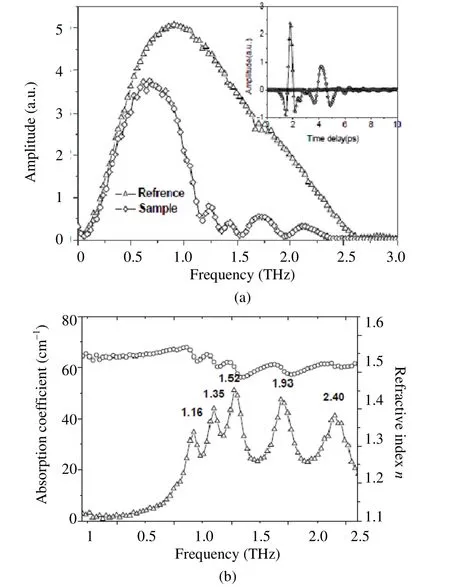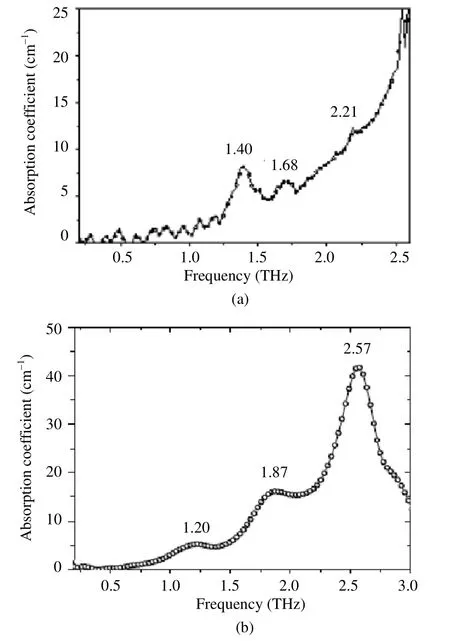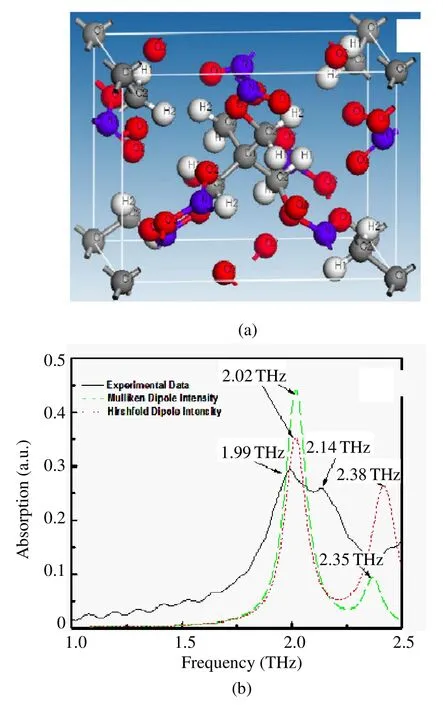Terahertz Time-Domain Spectroscopy and Its Applications
Guo-Zhong Zhao
1.Introduction
In recent year, the terahertz science and technology get a rapid development in China.Terahertz (THz) laboratory in Capital Normal University (CNU), as a special established terahertz research laboratory, has developed the system and technology for terahertz spectroscopy and imaging serving to a lot of THz research groups as a research platform.THz Laboratory in CNU has got several types of terahertz equipment including the terahertz time domain spectroscopy (THz-TDS) system[1], the terahertz active and passive imaging system, the terahertz and infrared heat wave nondestructive inspection system, and various kind of terahertz experimental platforms such as the experimental setup for the terahertz emission spectrum,terahertz photoconductive antenna[2], terahertz transmission and reflection spectroscopy, low-temperature terahertz spectroscopy, quasi-near field terahertz imaging, real time terahertz imaging, and stand-off terahertz imaging.Many terahertz experimental systems are developed based on the femtosecond laser.A typical setup uses the terahertz emitter based on the semiconductor surface radiation[3]and the electro-optic sampling terahertz detection[4].In this paper, a terahertz time domain spectroscopy system, especially the terahertz spectrometer designed and built by ourselves, is introduced in detail.By cooperating with several research groups, we investigate the terahertz spectra on various matters.Some results are summarized here as a reference of THz spectra database[5]-[17].
2.Terahertz Time Domain Spectrometer
Several terahertz time domain spectroscopy systems are built up in our laboratory since 2003.As an experimental platform, we set up the experimental equipment of terahertz emission based on the photoconductive antenna[2]and the electro-optic sampling terahertz detection[4],[5].The different substrate materials, electrode structures, and the size of antenna are investigated on this terahertz emission spectroscopic system[5].Our results show that the terahertz radiation of photoconductive antenna has a stronger terahertz emission intensity than that of optical rectification of electro-optic crystal.
However, the spectral width of photoconductive antenna emitter is limited by the phonon absorption of substrate.It is an important limitation to develop the terahertz spectroscopy which requires a wider spectral measurable range.We further investigate the terahertz emitter based on the semiconductor surface radiation by setting up a spectroscopic system of terahertz emission based on the semiconductor surface emitter and the electro-optic sampling terahertz detection.The terahertz emission spectra of different semiconductor materials including the bulk and epitaxial thin film of semiconductors are studied on this setup.The results show that the terahertz emission from some semiconductor surface has a wider spectral range, but the emission intensity is less than that of photoconductive antenna.The terahertz emission of InAs surface is the most effective emitter.By doping and material optimization, we found that the terahertz emission from the surface of InN can be more efficiency and has the wider spectral range.
Based on the terahertz emission from InAs or InN as an emitter and the terahertz detection of electro-optic sampling,we design and build up a terahertz spectrometer with the independent terahertz light chamber and sample chamber, the slow mechanic scan delay line, and the computer- controlled lock-in measurement system, as shown in Fig.1.
Here the terahertz emitter, electro-optic crystal, delay line stage, chopper with use of lock-in amplifier, and four parabolic mirrors are closed into an independent chamber named the main chamber.Another two independent chambers are designed for the sample and differential measuring units.
The main chamber and sample chamber are closed and enable nitrogen purging.Both of the sample chamber and the differential measurement chamber can be easily opened and closed by the doors.So this spectrometer can be used in the nitrogen purging chambers to reduce the humidity or water vapor, and suits for change the sample rapidly without touching the main light path.With the femtosecond laser, a lock-in amplifier and a computer together with our home-made software, this spectrometer can equip an ultrafast optical lab for extending into the research filed of the terahertz spectroscopy.At the moment, our system provides a useful platform for the application of terahertz spectroscopy.

Fig.1.THz time-domain spectrometer developed in CNU: (a)photo and (b) light path.
3.Application of Terahertz Time Domain Spectroscopy
As mentioned above, we have investigated the terahertz spectra of various materials by cooperating with many research groups.A typical application for terahertz spectroscopy is to measure and identify the illegal drugs and explosives.
Fig.2 shows the terahertz frequency/time (inset)-domain spectrum and absorbance/refractive index of Ketamine (K-powder).The frequency-domain spectrum is from the time-domain spectrum by the fast Fourier transform (FFT) where the reference and sample spectrum are presented, respectively.The absorbance and refractive index of sample are calculated from the ratio between the reference and sample spectra[16].It is clear that Ketamine or called often K-powder as a kind of illegal drug and organic macro-molecule show the obvious fingerprint.Methamphetamine (MATM) often used illegally is a kind of amphetamine type stimulants (ATS) which has been investigated for a long time[17].Malonaldehyde (MDA) and 3,4-methylenedioxymethamphetamine (MDMA) are two new ATS which are improved from MATM in recent years.Fig.3 shows the terahertz absorbance spectra of MDA and MDMA, respectively, which is measured by THz-TDS.

Fig.2 THz frequency/time (inset)-domain spectra (a) and absorbance/refractive index spectra (b) of Ketamine.

Fig.3.THz absorbance spectra of (a) MDA and (b) MDMA.
On the other hand, the terahertz absorbance spectra of organic bimolecular can be analyzed by the quantum chemistry calculation.Often used software for the spectral simulation is the Gaussian program.THz Lab in CNU purchased the Gaussian 03 software in 2005.By modeling the molecular structure, one can calculate the dipole intensity of these molecules as a deep understanding for the spectral information.Fig.4 (a) shows the molecular crystal cell of the single bulk explosive PETN and its dipole intensity is calculated by another quantum chemistry software Dmol3in the THz frequency band, see Fig.4 (b).In Fig.4 (b), the experimental data of THz absorption of PETN is presented as the black solid curve which can be compared with the simulated dipole intensity of PETN single crystal.By using of the Material Studio Visualizer software, the results of theoretical simulation calculated by the Dmol3software is analyzed and compared with the experimental data by the THz-TDS.It is clearly evidenced that the absorption peak of PETN at 1.99 THz and 2.14 THz,respectively, are resulted from the molecular dipole oscillation at 2.02 THz and 2.35 THz or 2.38 THz of the calculated dipole intensity.

Fig.4.Simulation and experimental investigation of THz spectra of PETN: (a) molecular structure and (b) THz spectra by THz-TDS (experiment) and Gaussian simulation.
Similarly, we investigated the terahertz spectra of various materials such as the biological macro-molecules,cosmetics and fine chemical materials, edible pigments and food additives, homocysteic acid and related compounds,heavy ions in soil, Chinese medicines, tobacco and crops,oil and chemical products, carbon nanotubes,superconductors, and various semiconductors and their heterostructures.Due to the limitation of paper length, we present here only the two types of important materials, that is, the illegal drugs and the explosives.Other investigating results can be seen in [5]-[17].
4.Summary
In summary, the terahertz time domain spectroscopy developed by CNU including the terahertz spectroscopy and its applications are presented.The experience to build up the THz-TDS is introduced and shared with other research groups.We are pleased to open our lab and work together with other groups as a platform of THz spectroscopy.The results show that the killer application of THz spectroscopy must be found within the further exploring with the combine of other research works.
[1]G.-Z.Zhao, K.Yang, M.Wu, and C.-S.Liang, “Beam profile and spectral characteristic of THz wave in free space,” in Proc.of Ⅰnt.Conf.of Optical Ⅰnstrument and Technology, Beijing, 2008, pp.140.
[2]D.D.Nolte, “Semi-insulating semiconductor heterostructures: Optoelectronic properties and applications,”Journal of Applied Physics, vol.85, no.9, pp.6259–6289,1999.
[3]X.-C.Zhang, B.-B.Hu, J.T.Darrow, and D.H.Auston,“Generation of femtosecond electromagnetic pulses from semiconductor surfaces,” Applied Physics Letters, vol.56,no.11, pp.1011–1013, 1990.
[4]C.Winnewisser, P.U.Jepsen, M.Schall, V.Schyja, and H.Helm, “Electro-optic detection of THz radiation in LiTaO3,LiNbO3 and ZnTe,” Applied Physics Letters, vol.70, no.23,pp.3059–3071, 1997.
[5]L.-L.Zhang, G.-Z.Zhao, H.Zhong, Y.Hu, and C.-L.Zhang,“Time-resolved terahertz spectroscopy with free-space electro-optic sampling,”Chinese Physics Letters, vol.21, no.11, pp.2295, 2004.
[6]W.-N.Wang, H.-T.Yan, W.-W.Yue, G.-Z.Zhao, C.-L.Zhang, H.-B.Liu, and X.-C.Zhang, “THz spectrum of reduced glutathione,” Science in China Ser.G Physics,Mechanics & Astronomy, vol.48, no.5, pp.585–592, 2005.
[7]G.-Z.Zhao, Y.Tian, H.-Q.Sun, C.-L.Zhang, and G.-Z.Yang,“Multiband terahertz photonic band gaps of subwavelength planar fractals,” Chinese Physics Letters, vol.23, no.6, pp.1456, 2006.
[8]G.Zhao, H.Sun, Y.Tian, and C.Zhang, “Optical system for application of THz spectroscopy and THz imaging,” in Proc.of the Fourth Ⅰnt.Conf.on Photonics and Ⅰmaging in Biology and Medicine, Tianjin, doi: 10.1117/12.710675.
[9]G.-Z.Zhao, T.-H.Meng, C.-L.Zhang, and G.-Z.Yang,“Terahertz transmission properties of subwavelength fractral structures on copper foils,” Proc.of SPⅠE, doi:10.1117/12.755509.
[10]Y.Wang, W.Meng, G.-Z.Zhao, and C.-L.Zhang,“Resonantly enhanced transmission of terahertz radiation through periodic Arrays of subwavelength apertures,” Proc.of SPⅠE, doi: 10.1117/12.760056.
[11]X.-F.Jia, B.Yu, G.-Z.Zhao, and C.-L.Zhang, “Application of terahertz time-domain spectroscopy technology on cosmetics testing,” Proc.of SPⅠE, doi: 10.1117/12.759877.
[12]W.-H.Liang, K.Yang, G.-Z.Zhao, and C.-L.Zhang,“Propagation characteristics of terahertz wave through a single slit,” Proc.of SPⅠE, doi: 10.1117/12.760042.
[13]T.-F.Su, X.-F.Jia, G.-Z.Zhao, P.-Y.Han, Y.-J.Wang, Y.-L Li, B.Zhou, C.-P.Song, J.-F.Chang, and C.-R.Gong,“Characterization of original and expanded leaf-roots of tobacco by terahertz spectroscopy and X-ray microanalysis,” Materials Letters, vol.62, no.17–18, pp.2779–2782, 2008.
[14]L.-M.Yang, H.-Q.Sun, S.-F.Weng, K.Zhao, L.-L.Zhang,G.-Z.Zhao, Y.-G.Wang, Y.-Z.Xu, X.-Y.Lu, C.-L.Zhang,J.-G.Wu, and J.Chen, “Terahertz absorption spectra of some saccharides and their metal complexes,”Spectrochimica Acta Part A, vol.69, no.1, pp.160–166,2008.
[15]B.-H.Hou, Y.-L.Wang, G.-Z.Zhao, and T.-H.Meng, “THz spectrum of Cr3+:LiSrAlF6 crystal,” in Proc.of ⅠEEE:ⅠRMMW-THz’2008, Pasadena, 2008, pp.1155.
[16]G.-Q.Wang, J.-L.Shen, and Y.Jia, “Vibrational spectra of ketamine hydrochloride and 3, 4-methylenedioxymethamphetamine in terahertz range,” Journal of Applied Physics, vol.102, no.1, pp.013106, 2007.
[17]N.Li and J.-L.Shen, “Study on the terahertz spectrum of methamphetamine,” Optics Express, vol.13, no.18, pp.6750–6755, 2005.
 Journal of Electronic Science and Technology2014年2期
Journal of Electronic Science and Technology2014年2期
- Journal of Electronic Science and Technology的其它文章
- Decision Bayes Criteria for Optimal Classifier Based on Probabilistic Measures
- Call for Papers Journal of Electronic Science and Technology Special Section on Terahertz Technology and Applications
- Classification of Diabetic Macular Edema and Its Stages Using Color Fundus Image
- Efficient Terahertz Photoconductive Emitters with Improved Electrode Structures
- Absorption Spectrum Studies on the RDX Crystals with Different Granularity in Terahertz Frequency Range
- Low Power Computing Paradigms Based on Emerging Non-Volatile Nanodevices
